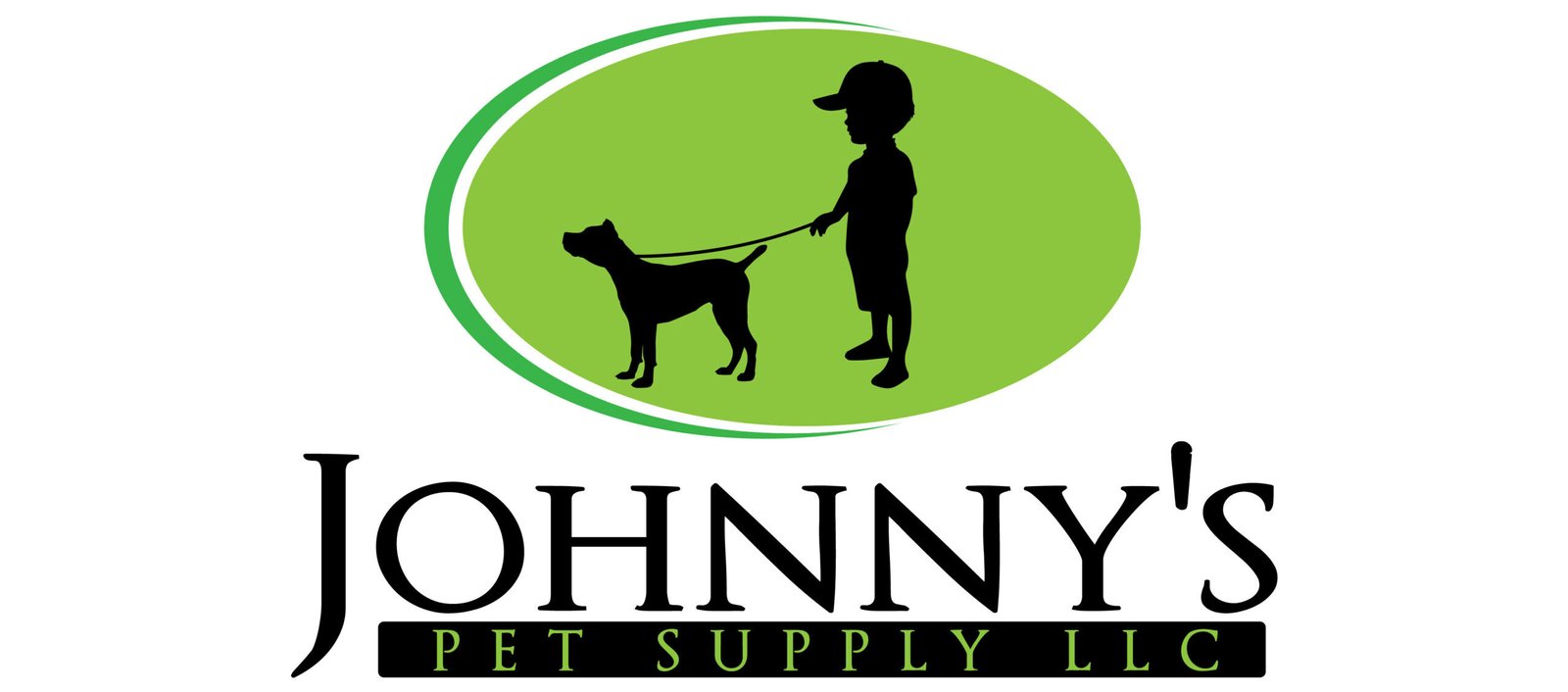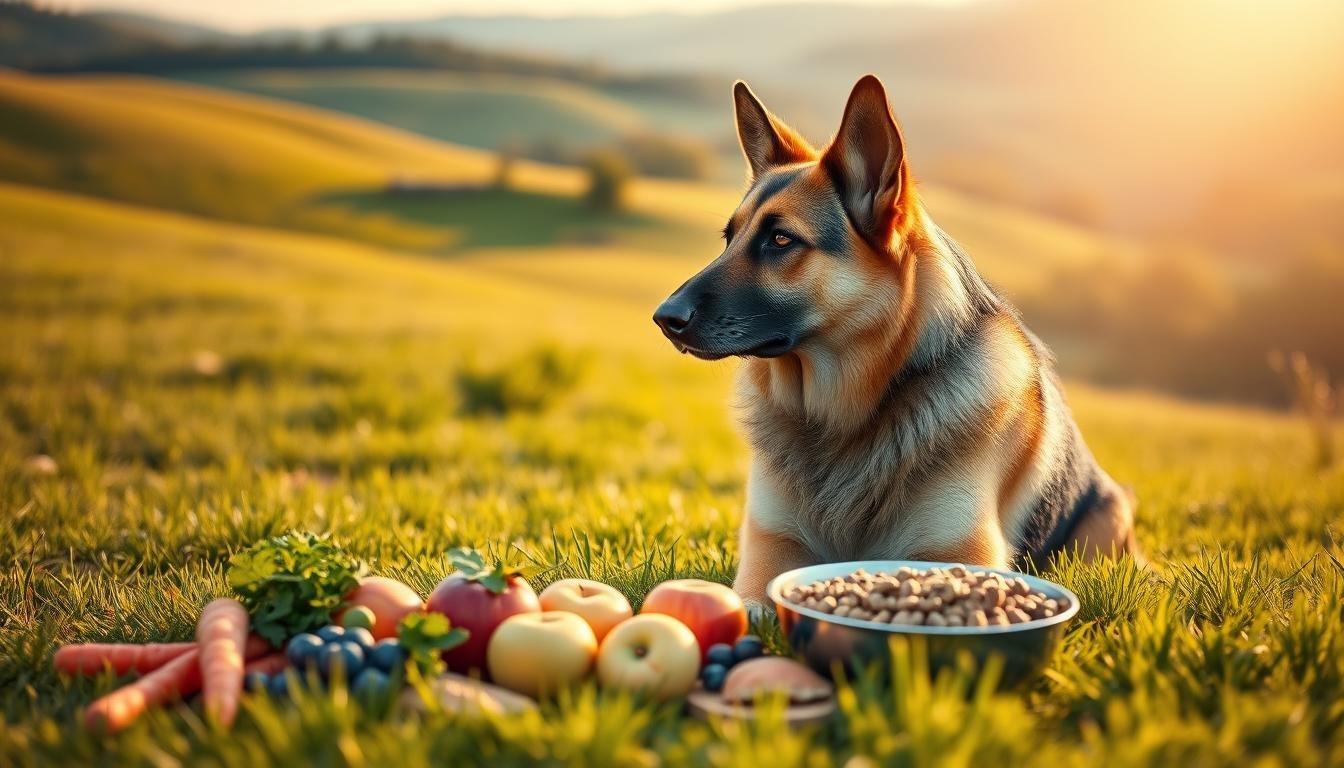The Best and Worst Foods for German Shepherds
German Shepherds are known for their intelligence, loyalty, and energetic nature, making a balanced diet crucial for their overall health. As a responsible dog owner, understanding what to feed your German Shepherd is vital to maintaining their energy levels and preventing common health issues.
With so many dog food options available, it can be overwhelming to choose the right one. A well-balanced diet is essential for supporting the active lifestyle of your dog. In this article, we’ll explore the nutritional requirements of German Shepherds and identify harmful ingredients commonly found in commercial food that you should avoid.
Key Takeaways
- Understand the nutritional needs of your German Shepherd
- Learn how to identify and avoid harmful ingredients in dog food
- Discover the importance of a balanced diet for your dog’s health
- Make informed decisions about your German Shepherd’s diet
- Ensure optimal nutrition for your dog throughout their life stages
Understanding Your German Shepherd’s Nutritional Needs
To keep your German Shepherd healthy and thriving, it’s essential to understand their nutritional needs. A well-balanced diet is crucial for maintaining their overall health, energy levels, and longevity. Proper nutrition directly impacts various aspects of your dog’s health, including their immune system, digestive health, coat quality, and energy levels.
Unique Dietary Requirements of German Shepherds
German Shepherds are prone to specific health issues that can be influenced by their diet, such as hip and elbow dysplasia, digestive sensitivities, and skin allergies. A well-balanced diet can help manage or prevent these common health problems, including bloat, food allergies, and inflammatory conditions. Nutritional deficiencies or excesses can manifest as skin problems, digestive issues, weight management challenges, or reduced energy in your German Shepherd.
The quality of ingredients in your dog’s food affects nutrient bioavailability and how efficiently their body can utilize these nutrients for optimal health. Therefore, it’s crucial to select a high-quality dog food that meets your German Shepherd’s nutritional needs.
How Nutrition Affects Your German Shepherd’s Health
The nutritional needs of German Shepherds are multifaceted, and their diet plays a significant role in maintaining their overall health. A diet rich in essential nutrients can enhance their coat quality, support their immune system, and maintain their energy levels. Furthermore, a well-balanced diet can help mitigate the risk of certain health conditions, ensuring your dog leads a healthy and active life.
By understanding the unique dietary requirements of your German Shepherd and making informed decisions about their nutrition, you can significantly impact their health and well-being. Regularly assessing your dog’s health and adjusting their diet as needed is vital for maintaining their optimal health.
The Best and Worst Foods for German Shepherds: An Overview
The right nutrition is fundamental for German Shepherds, impacting their health and longevity. A well-balanced diet is crucial for maintaining their overall well-being and preventing potential issues.
Why Diet Matters for This Breed
German Shepherds have unique nutritional needs due to their breed characteristics and high energy levels. Feeding them the right food is essential to support their health and activity level. A diet lacking in essential nutrients can lead to various health issues, including joint problems and obesity, which are common in this breed.
Providing the appropriate amount of food and maintaining a consistent feeding schedule are critical. Overfeeding or underfeeding can lead to significant health problems, making it vital to monitor their food intake closely.
Common Feeding Mistakes to Avoid
Many owners make critical mistakes when it comes to feeding their German Shepherds. Overfeeding is a common error, leading to obesity and exacerbating joint issues. It’s also crucial to provide the right balance of protein, as too little can result in insufficient energy for active dogs, while too much can strain the kidneys in less active dogs.
- Inconsistent feeding schedules can disrupt a German Shepherd’s digestive system.
- Choosing food with low-quality ingredients fails to support their nutritional needs.
- Ignoring portion control and not adjusting the amount of food based on age, weight, and activity level can lead to nutritional imbalances.
By avoiding these common mistakes and providing a balanced diet, you can help ensure your German Shepherd leads a healthy and active life.
High-Quality Protein Sources for German Shepherds
Providing your German Shepherd with high-quality protein sources is crucial for their overall health and well-being. A diet rich in premium protein supports their muscular build and maintains their energy levels. German Shepherds require a well-balanced diet that includes a variety of protein sources to ensure they receive all essential amino acids.
Chicken and Turkey: Lean Protein Options
Chicken and turkey are excellent lean protein options for German Shepherds. These protein sources are not only rich in essential amino acids but also highly digestible, making them ideal for maintaining your dog’s overall health. Lean proteins like chicken and turkey support muscle development and maintenance, which is particularly important for an active breed like the German Shepherd.
Beef and Lamb: Rich Protein Alternatives
Beef and lamb provide rich protein alternatives for German Shepherds, offering a different amino acid profile compared to chicken and turkey. These red meats are particularly beneficial for dogs that require a higher iron intake. Beef and lamb can be included in your dog’s diet to ensure a varied protein intake, supporting overall health and well-being.
Fish: Omega-Rich Protein Source
Fish is a highly nutritious protein source for German Shepherds, providing not only essential amino acids but also omega-3 fatty acids. Salmon, sardines, and mackerel are particularly beneficial due to their high EPA and DHA content, supporting brain function, joint health, and skin health. Fish-based diets can be an excellent alternative for dogs with sensitivities to common protein sources like chicken or beef.
- Fish provides a complete protein source that’s naturally rich in omega-3 fatty acids.
- Salmon, sardines, and mackerel are particularly beneficial fish options due to their high EPA and DHA content.
- Fish-based diets can be excellent alternatives for German Shepherds with allergies or sensitivities.
When selecting fish-based foods, look for specific fish sources and ensure the product is tested for heavy metals and contaminants.
Healthy Carbohydrates for Your German Shepherd
When it comes to feeding your German Shepherd, carbohydrates play a crucial role in providing energy and supporting overall health. A well-balanced diet that includes the right carbohydrates can help maintain your dog’s digestive health and overall well-being.
Sweet Potatoes and Other Root Vegetables
Sweet potatoes are a nutrient-rich carbohydrate source that can be a great addition to your German Shepherd’s diet. They are rich in fiber, vitamins, and minerals, making them an excellent choice. Other root vegetables like carrots and parsnips are also beneficial, providing essential nutrients and fiber.
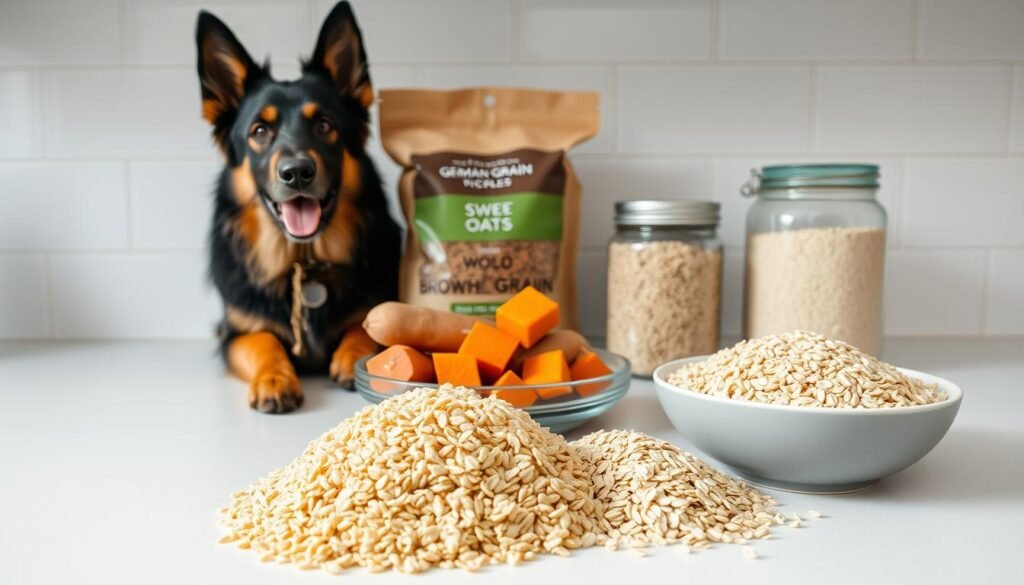
Rice and Oatmeal: Digestible Grain Options
Rice and oatmeal are easily digestible grain options that can be beneficial for German Shepherds, especially those with sensitive stomachs. The combination of chicken and rice is known for being easy on the digestive system. Brown rice and oatmeal provide complex carbohydrates that offer sustained energy without common allergens found in wheat or corn.
- Brown rice and oatmeal are rich in fiber, supporting digestive health and regulating bowel movements.
- Rice and oatmeal are often used in elimination diets due to their low allergenicity.
- Whole grain versions of rice and oatmeal provide maximum nutritional benefit.
By incorporating these healthy carbohydrates into your German Shepherd’s diet, you can help support their overall health and well-being. Remember to always choose whole, nutrient-rich options to provide the best possible food for your dog.
Essential Fats and Oils for Coat Health
A healthy coat is a reflection of your German Shepherd’s overall health, and essential fats and oils play a crucial role in maintaining it. The right balance of these nutrients is vital for supporting skin health, reducing inflammation, and promoting a shiny, healthy coat.
Omega-3 and Omega-6 Fatty Acids
Omega-3 and omega-6 fatty acids are essential for your German Shepherd’s skin and coat health. A higher content of omega-3 fatty acids has a natural anti-inflammatory effect when optimized against a reduced ratio to omega-6 fatty acids found in plant oils. This balance is crucial for maintaining healthy skin and a vibrant coat.
Your dog’s diet should include a balanced mix of these fatty acids to support their overall health and well-being.
Fish Oil and Flaxseed Benefits
Fish oil and flaxseed are two valuable sources of essential fatty acids for your German Shepherd. Fish oil provides readily available EPA and DHA omega-3 fatty acids that are directly usable by your dog’s body for anti-inflammatory and cognitive benefits.
- Regular supplementation with fish oil can help manage inflammatory conditions in German Shepherds, including skin allergies and arthritis.
- Flaxseed contains ALA omega-3 fatty acids, which provide valuable fatty acid support for your dog’s skin and coat.
When supplementing with fish oil or flaxseed, proper dosing based on your German Shepherd’s weight is essential to avoid excessive fat intake while providing optimal benefits.
Fruits and Vegetables Safe for German Shepherds
A well-nourished German Shepherd is a happy and healthy companion, and incorporating the right fruits and vegetables can make all the difference. A raw diet containing vegetables and berries provides antioxidants, which help to neutralize the free radicals that can lead to cell damage.
Nutrient-Rich Vegetables
Vegetables are a great way to add variety and nutrients to your German Shepherd’s diet. Some of the best options include:
- Carrots: rich in vitamin A, which supports healthy vision and immune function.
- Green beans: low in calories and rich in fiber, making them a great snack.
- Sweet potatoes: rich in vitamin A and fiber, supporting healthy digestion.
These vegetables can be cooked or steamed to make them more palatable for your dog. Always introduce new foods gradually to prevent digestive upset.
Safe Fruits as Occasional Treats
Fruits can be a delicious and healthy treat for your German Shepherd, but it’s essential to choose the right options. Some safe fruits include:
- Blueberries: rich in antioxidants and vitamins, with minimal sugar.
- Apples (without seeds): offer fiber, vitamins, and a satisfying crunch.
- Bananas: provide potassium and vitamin B6, but should be given sparingly due to their higher sugar content.
- Watermelon (seedless and without rind): offers hydration and vitamins with minimal calories.
When offering fruits to your German Shepherd, always introduce them gradually, remove any seeds or pits, and limit quantities to prevent digestive upset from excess sugar or fiber.
Dangerous Ingredients in Commercial Dog Food
When it comes to choosing the right food for your German Shepherd, it’s crucial to be aware of the harmful ingredients often found in commercial dog food. Many dog owners unknowingly feed their pets foods that contain artificial additives, fillers, and by-products that can jeopardize their health.
Artificial Preservatives to Avoid
Artificial preservatives are commonly used in commercial dog food to extend shelf life. However, these preservatives, such as BHA, BHT, and Ethoxyquin, have been linked to health issues in dogs, including cancer and liver damage. Opting for dog foods that use natural preservatives like vitamin E or tocopherols can significantly reduce the risk to your dog’s health.
Harmful Fillers and By-Products
Fillers and by-products are another concern in commercial dog foods. Ingredients like corn, wheat, and soy are often used as fillers, providing little to no nutritional value. By-products, which can include anything from animal parts to rendered remains, are also of questionable quality. These ingredients can lead to digestive issues and allergies in dogs, including German Shepherds.
Artificial Colors and Flavors
Artificial colors and flavors are added to dog food to make it more appealing to humans, not to provide any nutritional benefit to your dog. Colors like Red 40, Yellow 5, and Blue 2 have been associated with allergic reactions, hyperactivity, and potential long-term health risks. German Shepherds, with their working dog heritage, thrive on natural, minimally processed diets, making these additives particularly unnecessary.
By being mindful of these dangerous ingredients, you can make informed decisions about your German Shepherd’s diet, ensuring they receive the nutrition they need without exposing them to unnecessary risks. Always read the labels carefully and choose dog food that prioritizes natural, wholesome ingredients.
Toxic Foods That Can Harm Your German Shepherd
Understanding which foods are toxic to your German Shepherd is a critical step in maintaining their overall health and wellbeing. While it might be tempting to share your food with your dog, some human foods can be harmful or even fatal to them.
Common Kitchen Foods That Are Toxic
Many common kitchen foods can be toxic to your German Shepherd. For instance, garlic and onions belong to the Allium family and contain a compound that can damage your dog’s red blood cells, potentially leading to anemia. Other foods like chocolate contain theobromine, which can be toxic to dogs, with darker chocolate being more dangerous due to its higher theobromine content. Additionally, macadamia nuts can cause weakness, depression, vomiting, tremors, and hyperthermia in dogs.
- Garlic and Onions: Can cause damage to red blood cells.
- Chocolate: Contains theobromine, toxic to dogs.
- Macadamia Nuts: Can cause weakness, depression, and other symptoms.
Being aware of these common kitchen foods that are toxic to your German Shepherd can help you prevent accidental poisoning. Always check the ingredients of the food you’re about to share with your dog.
Hidden Dangers in Processed Foods
Processed foods often contain hidden ingredients that can be harmful to your German Shepherd. For example, many processed human foods contain garlic powder or onion powder, which, like their fresh counterparts, can be toxic to dogs. Additionally, some commercial baked goods may contain chocolate chips or macadamia nuts, posing a risk if ingested.
- Processed Meats: May contain high levels of salt and preservatives.
- Commercial Baked Goods: Can contain chocolate chips or macadamia nuts.
- Condiments and Sauces: Often contain garlic, onions, or high amounts of salt.
To keep your German Shepherd safe, it’s crucial to read labels carefully and avoid giving them processed foods that could contain harmful ingredients.
Age-Specific Dietary Needs
As your German Shepherd grows and matures, their dietary needs change significantly. It’s essential to adjust their diet according to their age to ensure optimal health and well-being.
Puppy Nutrition: Supporting Healthy Growth
Puppies require a diet rich in nutrients to support their rapid growth and development. A high-quality puppy food with adequate protein levels is crucial for building strong muscles and bones. German Shepherd puppies need a balanced diet that includes essential vitamins and minerals to support their immune system and overall health.
Adult Diet: Maintaining Optimal Health
Adult German Shepherds require a diet that maintains their optimal health and energy levels. A balanced adult dog food with moderate fat content and high-quality protein sources is ideal. It’s also essential to monitor their weight and adjust their food intake accordingly to prevent obesity.
Senior Diet: Addressing Aging Needs
Senior German Shepherds have different dietary needs due to aging. They typically require fewer calories but maintained protein levels to prevent muscle loss. Senior dog food with glucosamine and chondroitin can help support joint health and mobility. Additionally, senior dogs may benefit from cognitive support nutrients like antioxidants and omega-3 fatty acids to maintain mental sharpness.
Some key considerations for senior German Shepherds include:
- Reduced calorie intake to prevent weight gain
- Maintained protein levels to prevent muscle loss
- Increased levels of joint supplements like glucosamine and chondroitin
- Cognitive support nutrients like antioxidants and omega-3 fatty acids
- Highly digestible ingredients and moderate fiber levels to support digestive health
Best Commercial Dog Foods for German Shepherds

The right commercial dog food can make a significant difference in your German Shepherd’s overall health and wellbeing. With so many options available, it’s essential to choose a high-quality dog food that meets their unique nutritional needs.
High-Quality Dry Food Options
When it comes to dry food, look for options that are rich in protein and made with wholesome ingredients. German Shepherds require a diet that supports their muscle health and energy levels. Some top dry food options include those with lamb as the primary protein source, such as Ollie Lamb Dish with Cranberries.
Ollie Lamb Recipe is a fresh, nutrient-dense option that provides lean protein for muscle maintenance, healthy fats for skin and coat health, and fiber for digestive support.
Wet Food Recommendations
Wet food can be an excellent addition to your German Shepherd’s diet, providing increased moisture content that supports kidney health and proper hydration. Look for premium wet food options that contain higher meat content and fewer carbohydrates than dry foods.
Some benefits of wet food include:
- Reduced exposure to artificial additives that may trigger sensitivities
- More palatable for picky German Shepherds or seniors with dental issues
- Fresh refrigerated options like Ollie provide human-grade ingredients with minimal processing
Worst Commercial Dog Foods to Avoid
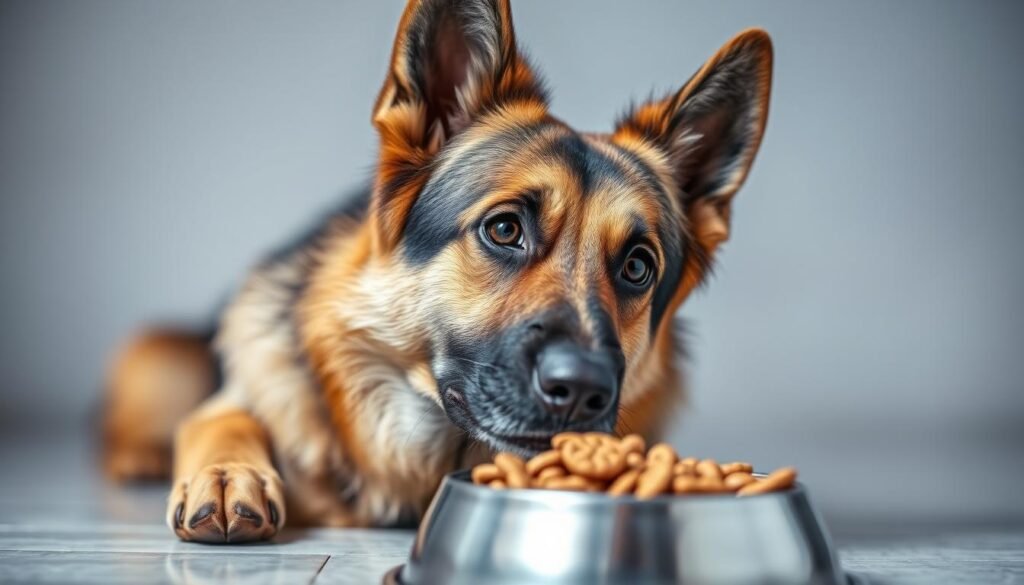
Selecting the right commercial dog food for your German Shepherd is a critical decision that can significantly impact their overall health and longevity. The wrong dog food can lead to a range of health issues, from digestive problems to more severe conditions.
Low-Quality Brands and Why They Fall Short
Some commercial dog foods are made with low-quality ingredients that can be detrimental to your German Shepherd’s health. Brands that use generic terms like “meat meal” or “animal by-products” without specifying the animal source are often indicative of poor quality protein. Additionally, dog foods containing multiple listed grains, especially corn, wheat, and soy, are often grain-heavy and protein-light, which is inappropriate for German Shepherds.
Reading Labels: Red Flags to Watch For
When reading dog food labels, there are several red flags to watch out for. Artificial preservatives like BHA, BHT, and ethoxyquin, as well as artificial colors and sweeteners like corn syrup, can be harmful to your German Shepherd’s health. Vague terms like “natural flavors” or “animal fat” without specific sources can also be a concern, as they may introduce allergens or vary in composition from batch to batch. Furthermore, excessive ingredient lists with many chemical-sounding additives generally indicate highly processed foods with poor nutritional value.
By being aware of these potential issues and carefully reading dog food labels, you can make an informed decision about the best food for your German Shepherd.
Homemade Diet Options for German Shepherds
German Shepherds, with their unique nutritional requirements, can greatly benefit from a well-planned homemade diet. Preparing your dog’s meals at home allows you to have complete control over the ingredients, ensuring that your German Shepherd receives the optimal balance of nutrients for their health and wellbeing.
Balanced Homemade Meal Recipes
When creating homemade meals for your German Shepherd, it’s crucial to include a variety of ingredients to achieve a balanced diet. This can include lean proteins like chicken, turkey, or fish, alongside complex carbohydrates such as sweet potatoes and brown rice. Don’t forget to add vegetables like carrots, green beans, and peas for essential nutrients. A well-rounded recipe might look like this: 75% lean protein, 10% complex carbohydrates, and 15% vegetables.
For example, a simple recipe could include cooked chicken, brown rice, and steamed carrots. This combination provides a good balance of protein, healthy carbs, and fiber. It’s also important to rotate protein sources and vegetables to ensure a broad spectrum of nutrients.
Supplements to Consider
Even with a balanced homemade diet, your German Shepherd may benefit from additional supplements. Calcium supplements are crucial unless you’re including raw meaty bones, as meat alone doesn’t provide adequate calcium for your dog’s skeletal health. Omega-3 fatty acid supplements from fish oil or algae sources support joint health, skin condition, and inflammatory response.
- Omega-3 fatty acids for joint health and skin condition.
- Vitamin E to prevent oxidation and support the immune system.
- Joint supplements containing glucosamine, chondroitin, and MSM to prevent hip and elbow dysplasia.
- A balanced vitamin and mineral supplement to fill any nutritional gaps.
Consulting with a veterinarian or canine nutritionist is essential to determine the best supplements for your German Shepherd, ensuring they receive all necessary nutrients without over-supplementing.
Raw Diet for German Shepherds: Pros and Cons
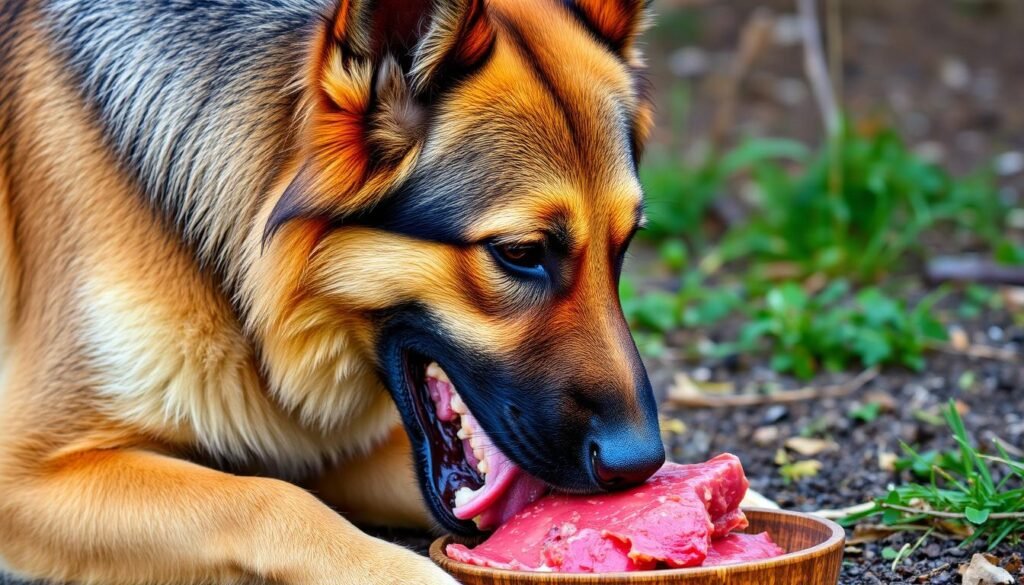
If you’re considering a raw diet for your German Shepherd, it’s essential to weigh the pros and cons. A raw diet can mimic your dog’s natural eating habits, potentially leading to various health benefits.
Benefits of Raw Feeding
A raw diet for German Shepherds can provide several health benefits. Introducing your German Shepherd puppy to a raw food diet early on may help protect against hip and elbow dysplasia and degenerative myelopathy. A 2014 study by Helsinki University found that a diet of raw food and bones showed a protective effect against canine hip dysplasia. For German Shepherds diagnosed with these conditions, a species-appropriate raw food diet can provide natural glucosamine, chondroitin, and collagen to support healthy joint structures.
Potential Risks and Considerations
While a raw diet has its benefits, there are also potential risks to consider. Raw diets can carry pathogen risks from bacteria like Salmonella and E. coli, affecting both your German Shepherd and human family members. Creating a balanced raw diet requires significant knowledge to avoid nutritional deficiencies. Additionally, raw diets can be costly and time-consuming, requiring dedicated freezer space. Whole bones pose risks of choking or tooth fracture if not sized correctly for your dog. Transitioning to a raw diet should be done gradually to prevent digestive upset.
Feeding Schedule and Portion Control
Establishing a proper feeding schedule and controlling portion sizes are crucial for maintaining your German Shepherd’s overall health. A well-balanced diet is essential, but it’s equally important to ensure that your dog is eating the right amount of food at the right time.
How Much to Feed Your German Shepherd
The amount of food your German Shepherd needs depends on several factors, including their age, size, and activity level. Generally, a German Shepherd dog requires a significant amount of high-quality dog food to maintain their weight and support their energy needs. You should consider your dog’s individual needs and adjust their food amount accordingly. A good rule of thumb is to monitor your dog’s weight and adjust their food intake to maintain a healthy weight.
It’s also important to consider the nutritional content of your dog’s food. Look for high-quality dog food that is rich in protein, moderate in fat, and low in carbohydrates. Avoid overfeeding, as this can lead to weight gain and other health problems.
Feeding Frequency by Age
German Shepherds have different feeding needs at various stages of their lives. Here’s a general guideline for feeding frequency based on age:
- Puppies (8-12 weeks): 3-4 small meals daily to support rapid growth and prevent hypoglycemia.
- Puppies (3-6 months): 3 meals per day, transitioning to a more structured feeding routine.
- Adolescent dogs (6-12 months): 2-3 meals daily, with increasing portion sizes to accommodate continued growth.
- Adult dogs: 2 meals per day, helping to prevent hunger and reduce the risk of bloat.
- Senior dogs: 2 meals per day, with adjusted portions to prevent weight gain and ensure adequate nutrition.
By following this feeding schedule and adjusting portion sizes according to your German Shepherd’s needs, you can help maintain their overall health and well-being.
Diet Solutions for Common German Shepherd Health Issues
Diet plays a crucial role in addressing common health issues in German Shepherds. A well-balanced diet can help mitigate various health problems, improving your dog’s quality of life.
Foods That Help with Joint Health
German Shepherds are prone to joint issues, such as hip dysplasia. Foods rich in omega-3 fatty acids, like fish oil, can help reduce inflammation. Additionally, ingredients like glucosamine and chondroitin are known to support joint health. Incorporating these nutrients into your dog’s diet can help alleviate joint pain and improve mobility.
- Foods with omega-3 fatty acids help reduce joint inflammation.
- Glucosamine and chondroitin support cartilage health.
Dietary Management for Sensitive Stomachs
Some German Shepherds have sensitive stomachs, which can lead to digestive issues. Feeding a diet with novel protein sources, such as venison or duck, can help manage these issues. It’s also beneficial to include easily digestible carbohydrates like rice or oatmeal. Avoiding common allergens and fillers can further help in stabilizing your dog’s digestive health.
- Novel protein sources can reduce digestive issues.
- Easily digestible carbs support gut health.
Nutrition for Skin and Coat Problems
German Shepherds can suffer from various skin issues, including dryness, itchiness, and “hot spots.” A diet rich in omega-3 fatty acids can help reduce inflammation and improve skin health. Zinc and vitamin A are also beneficial for skin regeneration. Furthermore, biotin-rich foods can enhance coat quality and reduce shedding.

- Omega-3 fatty acids improve skin barrier function.
- Zinc and vitamin A support skin regeneration.
- Biotin enhances coat quality.
By making informed dietary choices, you can significantly improve your German Shepherd’s health and wellbeing.
Conclusion: Creating the Optimal Diet for Your German Shepherd
With so many factors influencing your German Shepherd’s dietary needs, a personalized approach is essential. The optimal diet for your dog should be tailored to their individual needs, considering factors like age, activity level, health conditions, and personal preferences.
Whether you choose high-quality commercial food, homemade diets, or raw feeding, ensuring nutritional balance and appropriate caloric intake is crucial for your dog’s overall health. Regular monitoring of your German Shepherd’s weight, coat condition, energy levels, and stool quality provides valuable feedback about the suitability of their current diet.
- Consider consulting with veterinary professionals knowledgeable about canine nutrition to navigate dietary choices for your German Shepherd, especially when managing specific health conditions.
- Remember, your dog’s dietary needs will change throughout their life, requiring adjustments to maintain optimal health from puppyhood through the senior years.
By staying informed and adapting to your German Shepherd’s changing needs, you can provide the best possible diet for a long, healthy, and happy life. Your dog will thank you for the extra care and attention to their nutrition and overall health.
